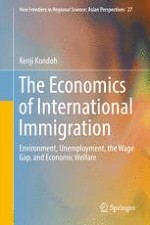2017 | OriginalPaper | Buchkapitel
8. Trans-boundary Pollution and Brain Drain Migration
verfasst von : Kenji Kondoh
Erschienen in: The Economics of International Immigration
Verlag: Springer Singapore
Aktivieren Sie unsere intelligente Suche, um passende Fachinhalte oder Patente zu finden.
Wählen Sie Textabschnitte aus um mit Künstlicher Intelligenz passenden Patente zu finden. powered by
Markieren Sie Textabschnitte, um KI-gestützt weitere passende Inhalte zu finden. powered by
